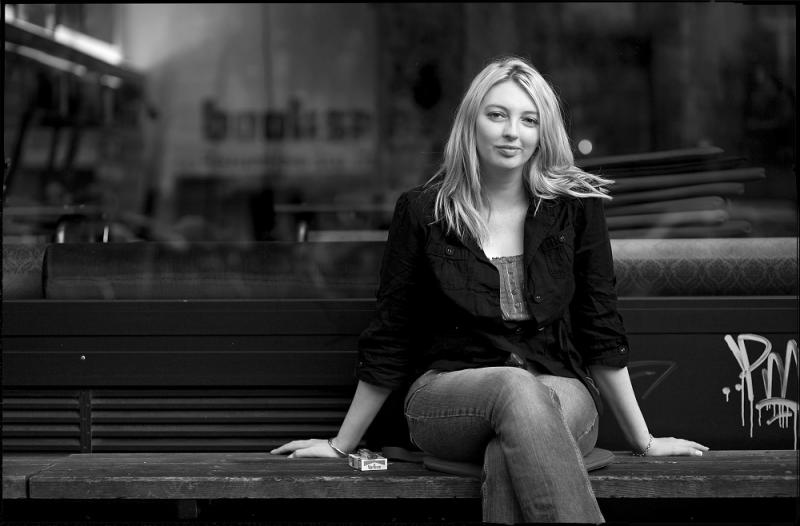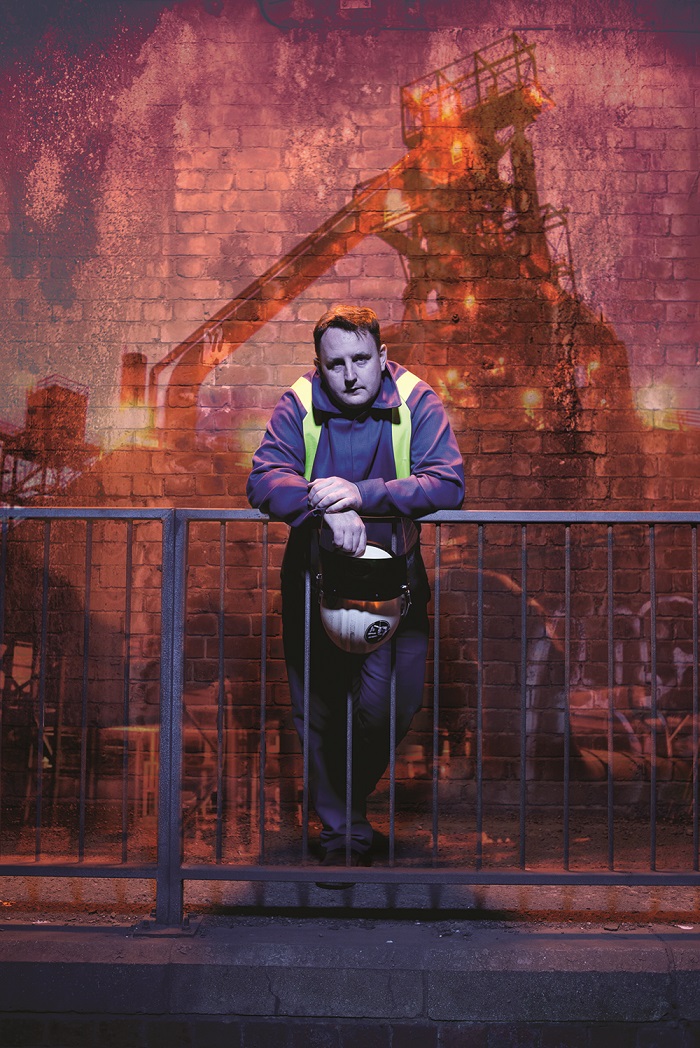'We're Still Here': Rachel Trezise on her NTW play about Port Talbot steelworkers | reviews, news & interviews
'We're Still Here': Rachel Trezise on her NTW play about Port Talbot steelworkers
'We're Still Here': Rachel Trezise on her NTW play about Port Talbot steelworkers
The novelist and playwright introduces her new verbatim play about the last industrial outpost in Wales

I’ve always written alone. As a novelist, that’s what you do. Sit around in your pyjamas composing sentences that come almost entirely from your own imagination. It’s difficult sometimes to conjure the self-discipline required to complete a draft in a satisfactory period of time, but it is always safe. The first draft is supposed to be dross. Nobody’s going to see it.
I knew that working with Common Wealth on my second play with National Theatre Wales would be a different experience. As a company Common Wealth are not necessarily interested in traditional storytelling but in creating unexpected experiences in theatre. Their work is absolutely contemporary, based in the present moment, and employs verbatim. It is almost the complete reverse of the way I’d ordinarily construct a narrative. We started with research, interviewing people based around the play’s subject: steelworkers, union representatives and community members. What was said in their testimonies would be the starting point, the inspiration and the story. When we had enough material we sat down and devised every scene together. (Pictured below: Sam Coates, from the cast of We're Still Here. Photo by Jon Pountney & Elfen / National Theatre Wales)
 What we do have in common is politics and a social class. Common Wealth are unapologetically political, their ideas rooted in socialism. The politics in my own work are a little more reserved. “Politics with a small p” is how people describe it. My early fiction is about the effects of Thatcherism on the working-class communities of the South Wales valleys, told with much hindsight and possibly without ever mentioning Thatcher. My latest collection of stories Cosmic Latte revolves around a loose theme of the benefits of immigration, a somewhat gentle protest against the anti-immigration argument that was gaining momentum in the years preceding the Brexit vote.
What we do have in common is politics and a social class. Common Wealth are unapologetically political, their ideas rooted in socialism. The politics in my own work are a little more reserved. “Politics with a small p” is how people describe it. My early fiction is about the effects of Thatcherism on the working-class communities of the South Wales valleys, told with much hindsight and possibly without ever mentioning Thatcher. My latest collection of stories Cosmic Latte revolves around a loose theme of the benefits of immigration, a somewhat gentle protest against the anti-immigration argument that was gaining momentum in the years preceding the Brexit vote.
Left to my own devices a play about the 2016 job losses and pension crisis at Port Talbot steelworks would have focused quite heavily on the history of the plant. My father grew up on the Sandfields Estate in Port Talbot and worked there, along with his father and a couple of his brothers, when I was a toddler in the Eighties. Tracing the plant’s trajectory through the past three decades and via its various owners (one-time employer of 18,000 workers; currently of 4,000) reveals a rough picture of how life has changed dramatically for the working classes in the UK throughout my lifetime: there was a time when union membership was at its peak, when the local council provided adequate housing, when working families could live comfortably on the wage of one breadwinner. A time when men could retire in good health with a generous pension to look forward to.
But what our research showed us was that the youngest members of the workforce and of our potential audience had no memory or experience of that way of life. They couldn’t be angry at losing something they never knew they’d had. But they were angry at what was happening to them presently. That meant tackling the subject with much more urgency than I’ve ever considered necessary before. Tata’s decisions to put the plant up for sale, to put the sale on hold, and eventually its offer of a deal should workers vote to accept pension reform, all occurred during the time I was working on the script.
It was a brand new way of working: constantly keeping my ear to the ground, constantly thinking on my feet, cutting, updating, rethinking. There was no real first, second or third draft, rather one long blueprint that continuously developed, continuously breathed, continuously advanced. It wasn’t by any stretch of the imagination a comfortable way to work, but of course some level of discomfort is inevitable when you wish to learn and grow.
- We're Still Here by Rachel Trezise is at Byass Works, Old Dock Road, Port Talbot from 15 to 30 September
- Read more First Person articles on theartsdesk
Explore topics
Share this article
Subscribe to theartsdesk.com
Thank you for continuing to read our work on theartsdesk.com. For unlimited access to every article in its entirety, including our archive of more than 15,000 pieces, we're asking for £5 per month or £40 per year. We feel it's a very good deal, and hope you do too.
To take a subscription now simply click here.
And if you're looking for that extra gift for a friend or family member, why not treat them to a theartsdesk.com gift subscription?
more Theatre
 The Buddha of Suburbia, Barbican Theatre review – farcical fun, but what about the issues?
Hanif Kureishi classic gets a compulsively comic makeover from Emma Rice
The Buddha of Suburbia, Barbican Theatre review – farcical fun, but what about the issues?
Hanif Kureishi classic gets a compulsively comic makeover from Emma Rice
 How To Survive Your Mother, King's Head Theatre review - mummy issues drive autobiographical dramedy
Lots of heartache, but a strange void where the heart of the play should be
How To Survive Your Mother, King's Head Theatre review - mummy issues drive autobiographical dramedy
Lots of heartache, but a strange void where the heart of the play should be
 Dr Strangelove, Noël Coward Theatre review - an evening of different parts
Kubrick’s humour doesn't always detonate as it should in Armando Iannucci's version
Dr Strangelove, Noël Coward Theatre review - an evening of different parts
Kubrick’s humour doesn't always detonate as it should in Armando Iannucci's version
 Reykjavik, Hampstead Theatre review - drama frozen by waves of detail
Richard Bean’s new play revisits the Hull fishing industry of the 1970s
Reykjavik, Hampstead Theatre review - drama frozen by waves of detail
Richard Bean’s new play revisits the Hull fishing industry of the 1970s
 The Forsyte Saga Parts 1 and 2, Park Theatre review - if Chekhov did soap operas
Joseph Millson leads a super cast in a classy production from Troupe Theatre Company
The Forsyte Saga Parts 1 and 2, Park Theatre review - if Chekhov did soap operas
Joseph Millson leads a super cast in a classy production from Troupe Theatre Company
 The Wild Duck, The Norwegian Ibsen Company, Coronet Theatre review - slow burn, devastating climax
Ibsen's pitiless take on the 'life lie' is another triumph for Norwegians in Notting Hill
The Wild Duck, The Norwegian Ibsen Company, Coronet Theatre review - slow burn, devastating climax
Ibsen's pitiless take on the 'life lie' is another triumph for Norwegians in Notting Hill
 Autumn, Park Theatre review - on stage as in politics, Brexit drama promises much, but loses its way
Promising production, beautifully acted, slides into side plots and confusion
Autumn, Park Theatre review - on stage as in politics, Brexit drama promises much, but loses its way
Promising production, beautifully acted, slides into side plots and confusion
 The Fear of 13, Donmar Warehouse review - powerful analysis of a gross injustice
A magnificent Adrien Brody leads a moving production by Justin Martin
The Fear of 13, Donmar Warehouse review - powerful analysis of a gross injustice
A magnificent Adrien Brody leads a moving production by Justin Martin
 The Duchess [of Malfi], Trafalgar Theatre review - actors imprisoned by confused time travelling
Zinnie Harris's modern take robs the play of its tragic potential
The Duchess [of Malfi], Trafalgar Theatre review - actors imprisoned by confused time travelling
Zinnie Harris's modern take robs the play of its tragic potential
 What We Talk About When We Talk About Anne Frank, Marylebone Theatre review - explosive play for today
Nathan Englander probes a divide in modern Jewish identity; Patrick Marber directs
What We Talk About When We Talk About Anne Frank, Marylebone Theatre review - explosive play for today
Nathan Englander probes a divide in modern Jewish identity; Patrick Marber directs
 Land of the Free, Southwark Playhouse review - John Wilkes Booth portrayed in play that resonates across 160 years
A president shot, as a divided country seeks political solutions
Land of the Free, Southwark Playhouse review - John Wilkes Booth portrayed in play that resonates across 160 years
A president shot, as a divided country seeks political solutions
 Oedipus, Wyndham's Theatre review - careful what you wish for
Mark Strong and Lesley Manville are the powerhouse heart of Robert Icke's adaptation
Oedipus, Wyndham's Theatre review - careful what you wish for
Mark Strong and Lesley Manville are the powerhouse heart of Robert Icke's adaptation

Add comment